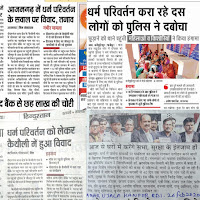As a Kulin Brahmin in the service of the Muslim rulers of Bengal, Ram Mohan Roy was well versed not only with the classical-cum-offical languages of his era, i.e., Persian, Sanskrit and Arabic, but also with the prevalent religious ideas of the time. As a teenager, he had already rebelled against the system of idolatry; and contact with Islamic thought fuelled his monotheistic fervour further.
His brush with Europeans of Bengal, including both Unitarians and Serampore missionaries, opened for him a new vista of religious experience and vocabulary. Like Mahatma Gandhi many decades later, who found succor in Sermon on the Mount, Raja Ram Mohan Roy was deeply impressed by the saying of Jesus in the New Testament. He wrote a tract called The Precepts of Jesus: A Guide to Peace and Happiness in 1820. In the preface he refers to the foundational nature of the teachings of Jesus when he notes "that law which teaches that man should do unto others as he would wish to be done by, reconcile us to human nature, and render our existence agreeable to ourselves and profitable to the rest of mankind". He further states that although this idea "is partially taught also in every system of religion with which I am acquainted," it "is principally inculcated by Christianity". The tract, the small booklet, then presents the compilation of Roy's selections from the sayings of Jesus, which he thinks are essential to mankind's happiness and peace.
However, a major controversy erupted after the publication of this tract. Joshua Marshman, one of the Baptist missionaries in Serampore castigated Roy for doing violence to the teachings by disengaging the words from the person. Roy had presented teachings as important and not the man who said them. In that he was influenced by European Unitarians who did not believe in the divinity of Christ.
A lot can be said about the Roy–Marshman controversy. The heart of the matter perhaps lay in Roy's contention that human reason, through careful observation can find, recognise and worship God, whereas Marshman contended that God's true self cannot be observed, it can only be revealed by God himself, which He, in fact, did in his Son.
Roy believed in his faculty of reasoning. Marshman proposed submitting to God's revelation.
The controversy is alive even today. In popular culture, it was last seen in the Raj Kumar Hirani's Aamir Khan–starred 2014 film PK. The film does not deny the existence of God, but says that none of the religions can tell us anything about God. Religions themselves are corrupted. Using our reason, we need to find some universal principle or principles operating in all religions, and live by that code.
But this kind of universalism has a problem. A principle that belongs to all may belong to none—"the pitfall of universalism."
If religions are corrupted, what guarantees our reason’s escape from corruption.
Our present postmodern milieu has exposed the limits and corruption of reason. How should we recognise the truth then? How should we gain the true knowledge of God?
The Roy–Marshman debate is still relevant.
The Precepts of Jesus is an important book for the 21st-century Indians.






